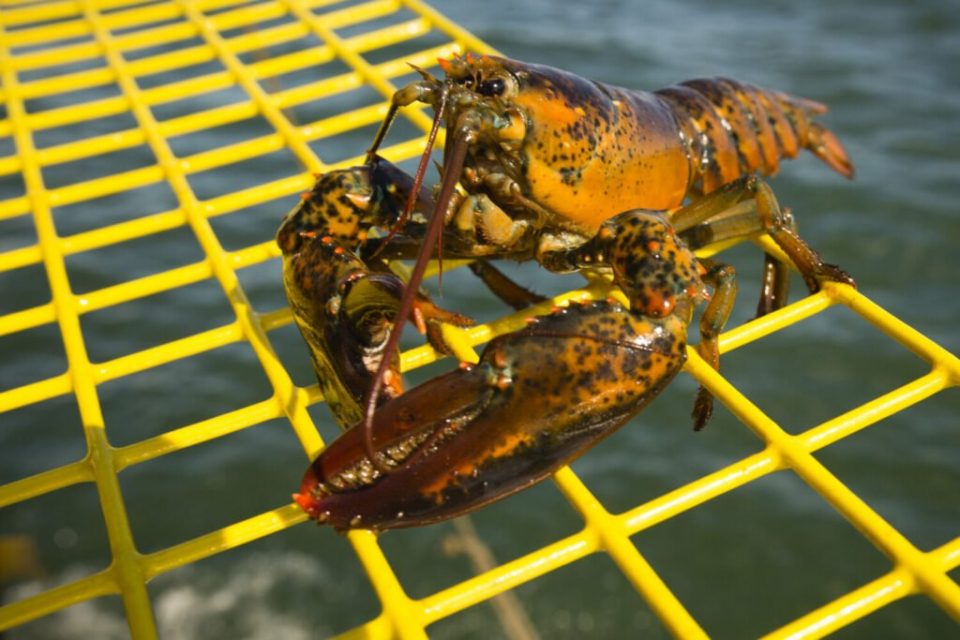The U.S. lobster industry has lost the sustainable seafood certification it needs to sell into some of the most prestigious markets around the world because an international auditor has concluded its rope-heavy fishing methods pose a deadly entanglement threat to the highly endangered North Atlantic right whale.
The Marine Stewardship Council, an independent, London-based nonprofit that sets sustainable fishing standards, is suspending its certification of the U.S. Gulf of Maine lobster fishery on Aug. 30. An emergency audit conducted by a third party unrelated to the fishery or the council concluded that the fishery, first certified in 2016, is no longer well managed or sustainable.
“Existing management measures are not likely to achieve the national requirements for the protection of right whales,” concluded MRAG Americas Inc., the contractor hired to review the lobster fishery. “There are more (whale) mortalities due to pot gear entanglement than (federal law) indicates is required not to hinder the recovery of the (whale) population.”
Starting in September, wholesalers and retailers who sell U.S.-landed Gulf of Maine lobster can no longer use the council’s trademarked “eco-label” of a blue-and-white fish that signals to buyers the product is sustainable – meaning that it is not overfished, the fishery itself is well managed and does not harm another overfished or endangered species.
The council’s certification is considered the gold standard of sustainable seafood, embraced by high-volume lobster buyers such as Whole Foods, Hilton, Royal Caribbean and Walmart, but it is not the only eco-label out there. Monterey Bay Aquarium and Gulf of Maine Research Institute have their own programs, both of which still rate U.S. Gulf of Maine lobsters as a sustainable choice.
But the council’s suspension hurts, said Hugh Reynolds, owner of Greenhead Lobster in Stonington. Greenhead doesn’t even use the council’s eco-label – Reynolds didn’t think it worth the “sizable” cost wholesalers and retailers paid for annual audits and use of the label – but he realizes that it buoyed the brand value of the entire industry.
“Any loss right now is huge,” Reynolds said. “We are in the fight of our life. Tariffs are making it hard to sell into a lot of big international markets. The pandemic has crushed the casinos, the cruise lines. Hotels and restaurants are struggling, to say the least. Now this, which really matters in some retail markets. This is the last thing we need.”
One of the oddities of the council’s suspension is that it only applies to the U.S. Gulf of Maine lobster fishery. Dealers that sell the very same species of lobster caught in the very same body of water by a Canadian lobsterman can still use the eco-label, even though the majority of serious or fatal right whale entanglements since 2017 have occurred in Canada.
Maine lobstermen have long argued that right whales are rarely found in Maine waters, and that neither federal regulators, scientists nor even whale advocates have yet to find a dead right whale entangled in Maine lobster fishing gear. The last time a right whale was entangled in Maine gear was in 2004, but it broke free and survived, data show.
But the auditor notes a lack of evidence does not mean the Gulf of Maine lobster fishery is not harming right whales. In 75 percent of fatal entanglements, the gear that killed the whale cannot be traced back to a specific fishery, even though it is obvious that some fishery somewhere is responsible for the death, MRAG Americas concluded.
Each lobster fishery has a different third-party auditor that actually conducts the review of the fishery. The auditors that certified the five Canadian lobster fisheries as sustainable concluded those fisheries were not responsible for right whale deaths during their certification periods, according to council spokeswoman Jackie Marks.
This story will be updated.
Related Stories



